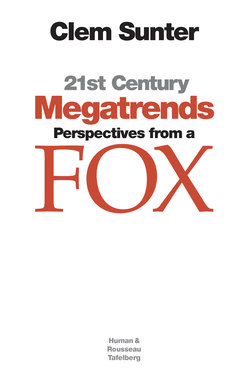Читать книгу 21st Century Megatrends: Perspectives from a Fox - Clem Sunter - Страница 11
На сайте Литреса книга снята с продажи.
Animal spirits
ОглавлениеI hope this chapter proves now and forever that the future, and particularly markets for shares and commodities, cannot be reduced to a mathematical model. Intuition is the key.
I’ve only just realised what a genius John Maynard Keynes really was. I was watching an interview of Alan Greenspan, ex-chairman of the US Federal Reserve Bank, on Bloomberg. He was asked what his forecast for the US economy over the next six months might be. He replied that he was beginning to believe Keynes’ words on animal spirits and that you had to use behavioural science to say anything about the US economy.
So I looked up the words of Keynes on the internet as he is considered the greatest British economist of the last century. This is what he said in The General Theory of Employment, Interest and Money, generally regarded as his masterpiece and published in 1936.
‘Most, probably, of our decisions to do something positive, the full consequences of which will be drawn out over many days to come, can only be taken as a result of animal spirits – of a spontaneous urge to action rather than inaction and not as the outcome of a weighted average of quantitative benefits multiplied by quantitative probabilities.
Thus if the animal spirits are dimmed and the spontaneous optimism falters, leaving us to depend on nothing but a mathematical expectation, enterprise will fade and die.’
Elsewhere he said: ‘Individual initiative will only be adequate when reasonable calculation is supplemented and supported by animal spirits, so that the thought of ultimate loss which often overtakes pioneers, as experience undoubtedly tells us and them, is put aside as a healthy man puts aside the expectation of death.’
There are two very different groups to whom I would like to read out these quotes. The first is the government here and, in particular, our President as well as the two ministers most closely associated with the development of our economy – Trevor Manuel and Ebrahim Patel. My questions to them would be: ‘Are you taking the advice of Keynes and doing everything to kindle the animal spirits of our present and future entrepreneurs? Is the raising of the next generation of South African industrialists foremost in your mind? What are you doing to create an environment in which these animal spirits are not dimmed by regulation but are allowed to roam free?’
The second group is across the ocean in America. The foxy methodology is increasingly being used by organisations there wishing to have an intense conversation about adapting their strategy to the extraordinary times we live in. One of the questions I am asked over and over again by institutions like MIT is what kind of mathematical model underpins the way we link the flags to the scenarios so that one can assign accurate probabilities to them. The answer is that we have none and prefer to use instinct and feel. Our probabilities are subjective and therefore open to debate.
I can now buttress our side of the argument by mentioning not only that the future only happens once, which makes it impossible to quantify the odds precisely on a particular scenario. I can now, in addition, invoke Keynes and his point that most innovative action derives from animal spirits and spontaneous urges rather than rational analysis.
I can end my address to both groups with the quip that foxes are animals with huge spirits. The best way to handle the future is to behave like one!
